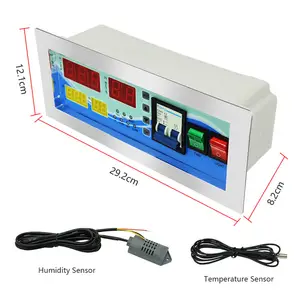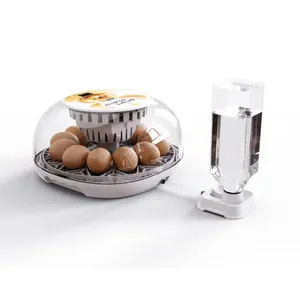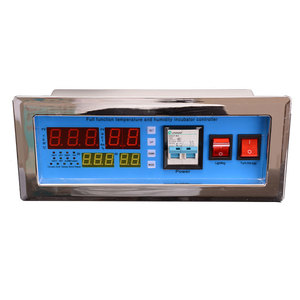Introduction to Automatic Controller for Incubator
The automatic controller for incubator is an essential device designed to maintain optimal environmental conditions for egg incubation. Whether you're a poultry farmer, a researcher, or an enthusiast, this gadget automates crucial processes, ensuring a higher hatch rate and healthier chicks. It precisely regulates temperature, humidity, and ventilation, creating a stable and favorable environment for eggs to develop. As technology advances, these controllers come equipped with enhanced features that streamline the incubation process, reduce manual labor, and improve reliability.
Types of Automatic Controllers for Incubator
There are several types of automatic controllers for incubator available in the market, each designed to cater to various incubation needs. Understanding the types helps users select the right model for their specific applications:
- Digital Controllers: These come with user-friendly interfaces and precise digital displays for monitoring various parameters.
- Analog Controllers: Offering a more traditional approach, these models are typically less expensive but can require more manual adjustments.
- Programmable Controllers: These advanced controllers allow users to set specific incubation periods, temperatures, and humidity levels tailored to different species.
- Wi-Fi Enabled Controllers: Integrating smart technology, these controllers offer remote monitoring and control via smartphones or computers.
Functions and Features of Automatic Controller for Incubator
The automatic controller for incubator boasts an array of functions and features designed to facilitate a seamless incubation process:
- Temperature Regulation: Maintains a consistent temperature to mimic natural incubating conditions.
- Humidity Control: Adjusts moisture levels to promote proper egg hatching, accommodating various species’ requirements.
- Ventilation Management: Optimizes air circulation, preventing carbon dioxide buildup and promoting healthy embryo development.
- Alarm System: Alerts users to any deviations in temperature or humidity levels, ensuring timely intervention when necessary.
- Built-in Timer: Helps track and manage incubation time effectively, allowing for successful hatch timing.
Applications of Automatic Controller for Incubator
The use of an automatic controller for incubator extends across various sectors, each benefiting from controlled hatching environments:
- Poultry Farming: Widely adopted in hatcheries to optimize eggs from chickens, ducks, and other poultry.
- Wildlife Conservation: Utilized in breeding programs for endangered species to help with ongoing conservation efforts.
- Research Institutions: Used in laboratories studying embryonic development and artificial reproduction techniques.
- Hobbyist Breeders: Perfect for individuals engaged in breeding exotic birds, reptiles, or other species requiring controlled incubation.
Advantages of Using an Automatic Controller for Incubator
Investing in an automatic controller for incubator is not only about convenience; it brings significant advantages that elevate the incubation experience:
- Increased Hatch Rates: By maintaining optimal conditions, hatch rates increase significantly, resulting in more viable chicks.
- Reduction of Labor: Automating the incubating process alleviates the burden of constant monitoring, allowing users to focus on other important tasks.
- Improved Reliability: Consistent environmental control reduces instances of human error, leading to more predictable outcomes.
- Cost-Effective: In the long run, the efficiency gained through automation can lead to reduced overall costs in poultry farming and breeding.








































































































































































































